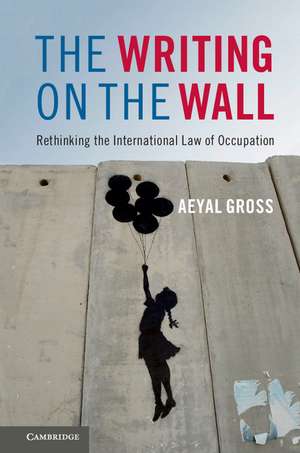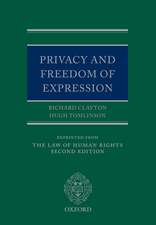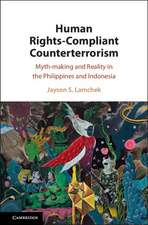The Writing on the Wall: Rethinking the International Law of Occupation
Autor Aeyal Grossen Limba Engleză Paperback – 23 mar 2017
Preț: 333.40 lei
Nou
Puncte Express: 500
Preț estimativ în valută:
63.80€ • 69.28$ • 53.60£
63.80€ • 69.28$ • 53.60£
Carte tipărită la comandă
Livrare economică 22 aprilie-06 mai
Preluare comenzi: 021 569.72.76
Specificații
ISBN-13: 9781316509326
ISBN-10: 131650932X
Pagini: 456
Ilustrații: 1 table
Dimensiuni: 151 x 228 x 25 mm
Greutate: 0.64 kg
Editura: Cambridge University Press
Colecția Cambridge University Press
Locul publicării:Cambridge, United Kingdom
ISBN-10: 131650932X
Pagini: 456
Ilustrații: 1 table
Dimensiuni: 151 x 228 x 25 mm
Greutate: 0.64 kg
Editura: Cambridge University Press
Colecția Cambridge University Press
Locul publicării:Cambridge, United Kingdom
Cuprins
Introduction; 1. The ends and fictions of occupation: between fact and norm; 2. The indeterminacy of occupation: from conceptualism to the functional approach; 3. Indeterminacy and control in the Occupied Palestinian Territory; 4. The construction of a wall between The Hague and Jerusalem: humanitarian law or a Fata Morgana of humanitarian law; 5. The securitization of human rights: are human rights the emperor's new clothes of the international law of occupation?
Recenzii
'Developed in the 19th century as a temporary device to protect civilians, the law of occupation has more recently revealed a tendency to turn into a lasting instrument of disciplining populations. Under a humanitarian pretence, military rule slides into colonial sovereignty. In this insightful work Aeyal Gross discusses cases such as Iraq, Afghanistan, Tibet, and Crimea, and especially the long-standing occupation of Palestine, in order to reveal the paradoxes and hypocrisies of the law of occupation. His critique is sharp and incisive but also sympathetic and oriented from a purely conceptual to a more openly normative reading of the law. This is a wonderful reflection of the limits and possibilities of using a traditional legal concept in a changed world of complex international conflict.' Martti Koskenniemi, author of The Gentle Civilizer of Nations: The rise and fall of international law 1870-1960
'The struggle for human rights and the enforcement of international humanitarian law must also include, this book strongly testifies, a profound mediation on the juridical, ethical and political foundation of these framework and a critical account of their limits and legitimizing effects. It is only rarely that a book with a potential to completely reframe our understanding of its subject matter emerges. This book does nothing less than reconceptualise our understanding of the legal reality of 'occupation' - with discussion primarily on the Israeli occupation of Palestine, but also on other occupations such as the American occupation of Iraq and with implications relevant to rethinking situations in many places world wide. It is at once a major intervention by one of legal studies most original scholars, and an indispensable resource for lawyers and non lawyers, accessibly written by a public intellectual whose activism always followed his scholarship.' Eyal Weizman, Goldsmiths, University of London
'On every level - theory, ethics, law, politics - The Writing on the Wall's rethinking of the law of occupation is both urgent and long-overdue. Confronting cutting-edge debates in a wide array of fields, Gross unflinchingly develops a bold and innovative framework, which will make this book the indispensable starting-point for all future discussions.' Nathaniel Berman, Rahel Varnhagen Professor of International Affairs, Law, and Modern Culture, Brown University
'The Writing on the Wall is a valuable response to growing frustration with the inadequacies of the law of occupation in redressing contemporary realities of foreign territorial control. The book, informed by Gross' deep involvement in the international practice he documents, addresses a key question that has been posed by civil society about Israel's occupation: has occupation law become so implicated in Israeli actions aimed at maintaining prolonged rule over Palestinian territory, that the law is now part of the problem?' Valentina Azarova, Opinio Juris
'Gross's analysis is not merely a critique of the application (or the non-application) of international humanitarian law by Israel, [it] also aims to examine the use of these legal frameworks in the context of an ongoing occupation. By arguing for a normative and functional approach to occupation, particularly in light of changing circumstances (such as in Gaza) so as to avoid legitimizing colonialism and conquest, Gross reframes our understanding of international humanitarian law.' Diana Buttu, Opinio Juris
'[…] Gross's excellent book The Writing on the Wall: Rethinking the International Law of Occupation presents a normative synthesis of international humanitarian and international human rights law design to provide an occupation law regime acutely focused on protected persons and the ensuring that the temporariness of the occupation. […] His account of the legal treatment of these various situations, and his very detailed discussion of the case law of the Israeli High Court, are invaluable for any student of international humanitarian law.' Eugene Kontorovich, Opinio Juris
'One of the interesting observations Aeyal makes in his important new book The Writing on the Wall, is that new forms of control are radically challenging the law of occupation. Traditionally, occupation has been understood as a question of fact: territory will be considered occupied if there are 'boots on the ground' that demonstrate effective control. However, as Aeyal notes throughout the book, the law of occupation is fraught with complex realities. One of these realities is that new forms of technological and political control are increasingly relevant to the law of occupation.' Kristen Boon, Opinio Juris
'The struggle for human rights and the enforcement of international humanitarian law must also include, this book strongly testifies, a profound mediation on the juridical, ethical and political foundation of these framework and a critical account of their limits and legitimizing effects. It is only rarely that a book with a potential to completely reframe our understanding of its subject matter emerges. This book does nothing less than reconceptualise our understanding of the legal reality of 'occupation' - with discussion primarily on the Israeli occupation of Palestine, but also on other occupations such as the American occupation of Iraq and with implications relevant to rethinking situations in many places world wide. It is at once a major intervention by one of legal studies most original scholars, and an indispensable resource for lawyers and non lawyers, accessibly written by a public intellectual whose activism always followed his scholarship.' Eyal Weizman, Goldsmiths, University of London
'On every level - theory, ethics, law, politics - The Writing on the Wall's rethinking of the law of occupation is both urgent and long-overdue. Confronting cutting-edge debates in a wide array of fields, Gross unflinchingly develops a bold and innovative framework, which will make this book the indispensable starting-point for all future discussions.' Nathaniel Berman, Rahel Varnhagen Professor of International Affairs, Law, and Modern Culture, Brown University
'The Writing on the Wall is a valuable response to growing frustration with the inadequacies of the law of occupation in redressing contemporary realities of foreign territorial control. The book, informed by Gross' deep involvement in the international practice he documents, addresses a key question that has been posed by civil society about Israel's occupation: has occupation law become so implicated in Israeli actions aimed at maintaining prolonged rule over Palestinian territory, that the law is now part of the problem?' Valentina Azarova, Opinio Juris
'Gross's analysis is not merely a critique of the application (or the non-application) of international humanitarian law by Israel, [it] also aims to examine the use of these legal frameworks in the context of an ongoing occupation. By arguing for a normative and functional approach to occupation, particularly in light of changing circumstances (such as in Gaza) so as to avoid legitimizing colonialism and conquest, Gross reframes our understanding of international humanitarian law.' Diana Buttu, Opinio Juris
'[…] Gross's excellent book The Writing on the Wall: Rethinking the International Law of Occupation presents a normative synthesis of international humanitarian and international human rights law design to provide an occupation law regime acutely focused on protected persons and the ensuring that the temporariness of the occupation. […] His account of the legal treatment of these various situations, and his very detailed discussion of the case law of the Israeli High Court, are invaluable for any student of international humanitarian law.' Eugene Kontorovich, Opinio Juris
'One of the interesting observations Aeyal makes in his important new book The Writing on the Wall, is that new forms of control are radically challenging the law of occupation. Traditionally, occupation has been understood as a question of fact: territory will be considered occupied if there are 'boots on the ground' that demonstrate effective control. However, as Aeyal notes throughout the book, the law of occupation is fraught with complex realities. One of these realities is that new forms of technological and political control are increasingly relevant to the law of occupation.' Kristen Boon, Opinio Juris
Notă biografică
Descriere
A critical analysis of Israel's control of the Occupied Palestinian Territory, advocating a normative and functional approach.






















